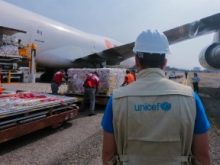 UNICEF has launched the Humanitarian Airfreight Initiative; under this landmark initiative, over 10 leading airlines are signing agreements with UNICEF to support the prioritisation of delivery of COVID-19 vaccines, essential medicines, medical devices and other critical supplies to respond to the pandemic. The initiative will also act as a global logistics preparedness mechanism for other humanitarian and health crises over the longer term. “Delivery of these life-saving vaccines is a monumental and complex undertaking, considering the sheer volumes that need to be transported, the cold chain requirements, number of expected deliveries and the diversity of routes,” said Etleva Kadilli, Director of UNICEF Supply Division. “We are grateful to these airlines for joining forces with the UNICEF Humanitarian Airfreight Initiative to support the roll-out of COVID-19 vaccines.”
UNICEF has launched the Humanitarian Airfreight Initiative; under this landmark initiative, over 10 leading airlines are signing agreements with UNICEF to support the prioritisation of delivery of COVID-19 vaccines, essential medicines, medical devices and other critical supplies to respond to the pandemic. The initiative will also act as a global logistics preparedness mechanism for other humanitarian and health crises over the longer term. “Delivery of these life-saving vaccines is a monumental and complex undertaking, considering the sheer volumes that need to be transported, the cold chain requirements, number of expected deliveries and the diversity of routes,” said Etleva Kadilli, Director of UNICEF Supply Division. “We are grateful to these airlines for joining forces with the UNICEF Humanitarian Airfreight Initiative to support the roll-out of COVID-19 vaccines.”
The UNICEF Humanitarian Airfreight Initiative brings together the airlines covering routes to over 100 countries, in support of the COVAX Facility – the global effort aimed at equitable access to COVID-19 vaccines. Based on the COVAX Facility’s indicative distribution and first round allocation plan, 145 countries will receive doses to immunize around three per cent of their population, on average, starting in the first half of 2021, subject to all requirements being met and final allocation plans.
In addition to prioritising shipments of these life-saving supplies, the airlines will take measures such as temperature control and security, while also adding freight capacity to routes where needed. Their commitments are critical to the timely and secure delivery of vaccines and critical supplies.
Safe, timely and efficient transportation of life-saving supplies is critical to supporting access to essential services for children and families. COVAX deliveries and the subsequent vaccination of frontline workers will support health and social care systems to safely resume these critical services.
Breaking News
- DCSC gets Air Cargo Terminal Operator Award at ICA 2025
- Etihad Airways orders three Airbus A350Fs for global ops
- Glasgow Prestwick Airport plans to expand cargo ops in India
- ‘One Airport, One Product’ to transform India’s cargo ops
- SpiceXpress wins Best Airline & LSP Award
- ‘Global conflicts disrupted supply chains, increased costs’
- Global cargo ops resume at Visakhapatnam Airport
- October cargo volumes up 4% YOY: Xeneta
- Personalisation & sustainability to be major trends next year’
- ‘2026 will be the year of AI, predictive intelligence and sustainability’
- ‘ Focusing on enhancing visibility and collaboration’
 Cargo Breaking News
Cargo Breaking News


